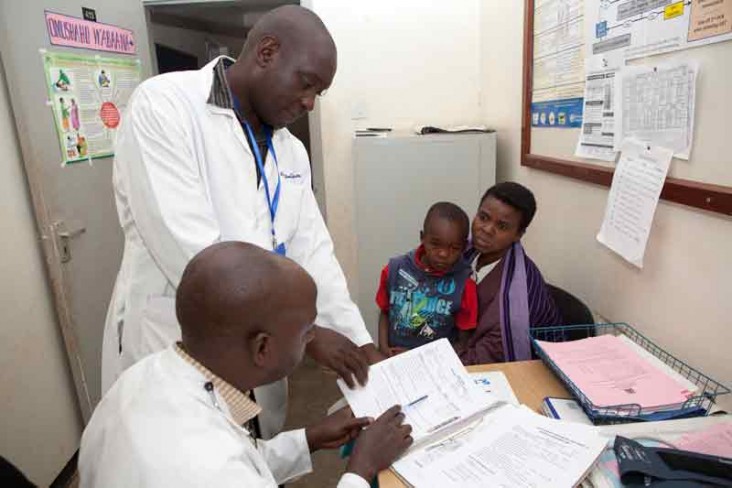- What We Do
- Agriculture and Food Security
- Democracy, Human Rights and Governance
- Economic Growth and Trade
- Education
- Ending Extreme Poverty
- Environment and Global Climate Change
- Gender Equality and Women's Empowerment
- Global Health
- Water and Sanitation
- Working in Crises and Conflict
- U.S. Global Development Lab


Margaret M. McCluskey, RN, MPH
Senior Technical Advisor, HIV Vaccines
Margaret McCluskey is the senior technical advisor for HIV vaccines in the U.S. Agency for International Development (USAID) Office of HIV & AIDS (OHA) and has been a registered nurse since 1980, working on the HIV/AIDS epidemic in one capacity or another from the beginning.
Recent Blog Posts
- At the Bedside of an Epidemic
Margaret M. McCluskey - May 18, 2016 - Welcome to the HIV and AIDS Research Blog
Benny Kottiri – May 18, 2016
HIV Is a Problem that Is yet Unsolved
HIV and AIDS continue to be serious global health threats from Washington, D.C., where rates of infection in some people exceed that of some sub-Saharan African countries to South Africa where some 2,000 young women ages 15–24 are infected with HIV each week— despite the impressive expansion of HIV care and treatment. The addition of new biomedical tools, like a preventive vaccine and microbicides,– are critical to creating an AIDS-free generation through the U.S. President’s Emergency Plan for AIDS Relief (PEPFAR), the world’s largest commitment to combat a single disease.
The Promise of a Vaccine Is Real
A vaccine capable of preventing HIV is needed now, more than ever, to solve the HIV problem— once and for all. Fortunately, the science pointing toward how an HIV vaccine must work is more promising than ever. The search for an HIV vaccine for global use is a key priority for USAID’s Office of HIV/AIDS, so, too, is building robust advocacy, communications, regulatory capacity and policies to support biomedical HIV prevention research and development (R&D) more broadly.
USAID Is Fully Committed to the Long-term Search for a Vaccine to Prevent HIV
As USAID marks 15 years of continuous dedication toward supporting R&D for a safe and globally-effective HIV vaccine, the Agency has designed, competed, and awarded two, complementary 5-year Cooperative Agreements, making up a new project called the HIV Vaccine and Biomedical Prevention Research Project (HVBP). This project has a combined award ceiling of $180 million and is the Bureau for Global Health’s principal mechanism for HIV vaccine R&D through 2021.
- Award One focuses on conducting preclinical and clinical HIV vaccine R&D while placing particular focus on building the capacity African scientific talent and institutional capacity that can adeptly engage in vaccine R&D locally, while developing and optimizing new partnerships.
- Award Two supports advocacy, literacy, policy, communications, community engagement, and regulatory activities for biomedical HIV prevention R&D globally, with a particular focus on relevant strategic partnerships in low- and lower middle-income countries.
Global Leaders Inspired the Design of This Project
The HVBP was based on the generous input from global leaders in HIV vaccine and biomedical prevention research who were consulted over a two-year period, through an exercise commonly called a Situation Analysis, in addition to the wisdom gained through a strategic African Consultation in 2014. These consultations engaged internationally renowned HIV scientists and advocacy experts who advised USAID to further its focus on strengthening scientific, institutional and individual capacity specifically in Africa, where the burden of HIV and AIDS continues to be acutely felt across families, communities, and entire economies.
The Heartbeat of the Activities Is African
African leadership is central to all activities in both awards. In fact, the primary goal of this initiative is to enable African-led, late-stage design and testing of improved HIV vaccine candidates to move the field closer to the long-term objective of a safe and globally-effective HIV vaccine. Increased involvement of African scientists and institutions will be at all stages of vaccine research and development, including design and testing of next-generation HIV vaccine candidates.
- Africa-centered science
- R&D capacity-building endeavors in low- and lower middle-income countries
- Forming and optimizing existing and novel strategic partnerships with other donor-supported endeavors
- Achieving efficiency and sustainability through leveraging resources and cost sharing
- Broad sharing of data locally and internationally
These awards will take into consideration the unique circumstances of the epidemic in key populations, ensuring an integrated approach toward the discovery of an HIV vaccine, while promoting robust advocacy for biomedical HIV prevention R&D. This will also enable evaluation of vaccine candidates’ use and efficacy in the very populations a vaccine would benefit the most.
And the Awardees Are…
Award One: The International AIDS Vaccine Initiative (IAVI) is the first awardee calling their new project, Accelerate the Development of Vaccines and New technologies to Combat the AIDS Epidemic (ADVANCE).
Award Two: AVAC is the second awardee, calling their project the Coalition to Accelerate and Support Prevention Research (CASPR).
USAID and our many partners on these two awards are excited by these new and promising models of multi-sector collaborations that will support the field, ultimately getting us all closer to a preventive vaccine, the definitive tool to end AIDS— perseverance that will surely pay off.
Additional Resources
- Read the brief: Investing in the Future: The Role of Africa in the Search for an HIV Vaccine [PDF, 570KB]
- Read USAID’s HVBP Awards Announcement
- Discover more blog posts from Margaret McCluskey
- Learn more about USAID’s work on HIV and AIDS vaccines







Add new comment